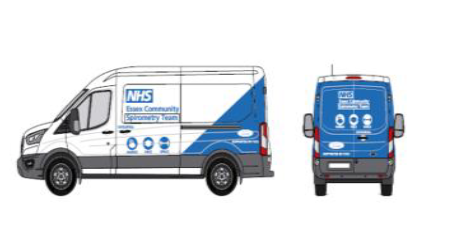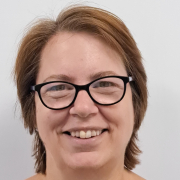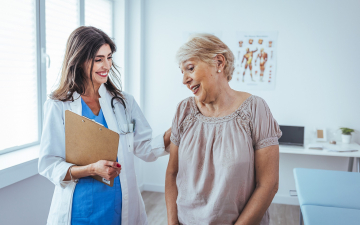
In 2020, my team and I were looking for new venues for our long COVID patients in mid and south Essex.
Responsible for this new service, the first challenge I faced was clinical space – finding space was difficult due to the fact I hadn’t previously worked in this area. The solution? The ‘Essex Vax Van’.
As we know, COVID-19 has had a disproportionate impact on Black, Asian and minority ethnic (BAME) communities.[1] They experienced higher infection and mortality rates than the white population, in large part due to differences in location, occupation, deprivation, living arrangements and health conditions.[2]
According to the latest 2021 census, the population in Essex is predominantly white (90.4%), with non-white minorities representing the remaining 9.6% of the population.[3] We wanted to increase the number of BAME communities accessing our services. 25% of people accessing the van are from BAME communities, indicating how successful the van has been.
The Essex Vax Van helped the NHS administer vaccines to minority groups and rural communities, and also incentivised hundreds of people to take up first-time vaccinations,[4] but it wasn’t being used as much. I accepted the offer of the van enthusiastically.
Reaching different communities
The van has allowed us to carry out various clinical activities on different communities, ranging from spirometry and blood pressure to 6 lead ECG.
As part of aims for widening access to post-COVID services, to reduce health inequalities, our success was reported as a case study in the NHS plan for long COVID services. It provides an example of how to improve access to hard-to-reach groups.[5]
A bespoke vehicle

Our custom-made transit van continues to offer a mobile clinic and pre-booked appointments. It is used as a clinic room, and we make every contact count by addressing the issues important to the individual.
The van is essentially a room with a chair. We bring our own equipment so we can carry out the following tests:
- Spirometry
- Blood pressure (BP)
- Heart rate and oxygen saturations
- A 6 lead Electrocardiogram (ECG)
- Height and weight
- Fractional Exhaled Nitric Oxide (FeNO)
The van in action
The transit van goes out to a wide geographical area, meaning we are able to access people who would not normally engage with NHS services. This gives us the ability to engage with people from different ethnic origins, those with learning disabilities and individuals not registered with a General Practitioner (GP).
When we go into the community, we talk about how to recognise signs of long COVID.
As a minimum, we have one nurse on the van, however, we try and work with local teams and ask them to come along to talk about their services.
On the van’s first day, we booked a busy sports centre, so there were a lot of people coming and going during the day. The van was parked so it was easily visible and we had a queue of people waiting up to two hours to see us, as well as local TV news reporters.
Since then, we have used the van as a clinic where we book patients an appointment, for tests such as spirometry. The van is a key component in bringing care closer to home.
One of our projects included visits to static traveller sites. We prepare for these by working with the County Council and liaison officers. The project has enabled us to have good engagement with the people on the sites, where we visit with other health professionals. As is often the case, travellers do not have access to health services and some people are not registered with a GP.[6] We work with health workers who can register people, making sure they have the knowledge, care and treatment they need to avoid serious life-limiting illness.
Another project included a visit to an area of high deprivation. We worked alongside nurses running a pop-up clinic to increase health engagement. This was another area where few people were registered with a GP and resulted in more people being registered.
We continue to use the van for popular areas where we encourage people to talk to us about their health concerns, assessing them if needed and referring them for activities such as smoking cessation, weight management and exercise.
Bringing care closer to home
With our mobile clinic, we have engaged with more people from different ethnic origins, traveller groups, learning disabilities and areas of deprivation than if we had used clinic rooms.
The van has enabled us to bring care closer to home while the team has increased awareness of diseases such as long COVID. Alongside this, we’ve identified people with hypertension and atrial fibrillation (AF) and have been able to refer them for treatment.
We have been able to get out and find those most at risk. Every contact counts and referring patients for the right services has helped us play a part in improving people’s health.
I would encourage people to think of different ways to improve health as, in my opinion, the traditional ways are not always the most successful.
[1] Phiri P, Delanerolle G, Al-Sudani A, et al. COVID-19 and Black, Asian, and Minority Ethnic Communities: A Complex Relationship Without Just Cause. JMIR Public Health Surveill. 2021; 7(2):e22581
[2] The King’s Fund. The health of people from ethnic minority groups in England. Available at: https://www.kingsfund.org.uk/publications/health-people-ethnic-minority-groups-england
[3] Varbes. Demographics of Essex. Available at: https://www.varbes.com/demographics/essex-demographics
[4] Mid and South Essex Integrated Care System. NHS and Ford Partner To Help Communities assess the impact of Long COVID With Bespoke Mobile Clinic Transit Van. Available at: https://www.midandsouthessex.ics.nhs.uk/news/nhs-and-ford-partner-to-help-communities-assess-the-impact-of-long-covid-with-bespoke-mobile-clinic-transit-van/
[5] NHS England. The NHS plan for improving long COVID services. Available at: https://www.england.nhs.uk/wp-content/uploads/2022/07/C1607_The-NHS-plan-for-improving-long-COVID-services_July-2022.pdf
[6] Care Quality Commission. Gypsies and Travellers. Available at: https://www.cqc.org.uk/sites/default/files/20160505%20CQC_EOLC_Gypsies_FINAL_2.pdf



 Ruth Barlow
Ruth Barlow 

